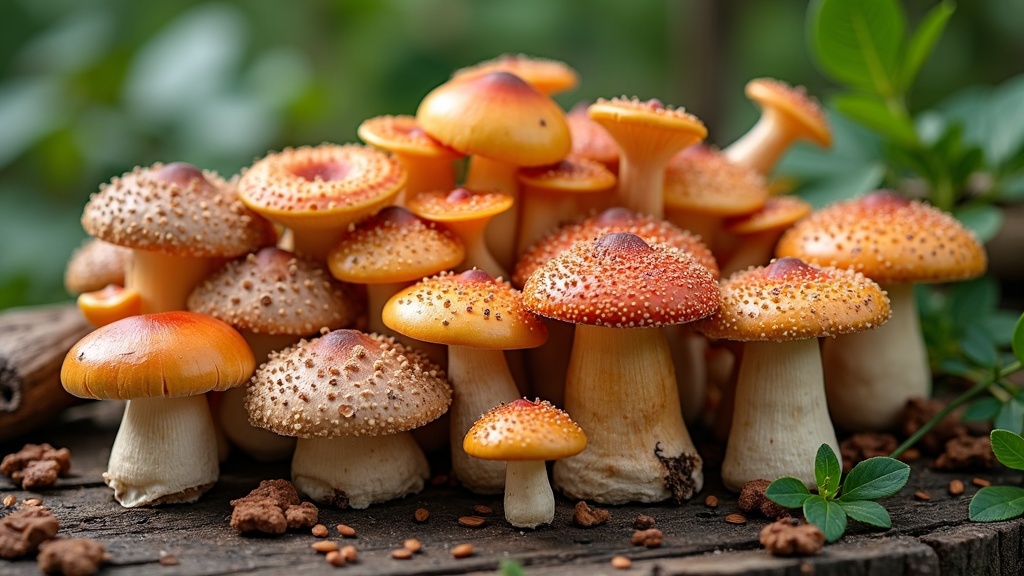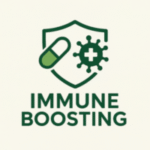Mushrooms have become a staple in my kitchen, not just for their earthy flavor, but also because of how they can help my immune system. For anyone who’s been curious about natural ways of supporting immunity, mushrooms are a popular and well-researched choice. In this article, I’m breaking down the science behind mushrooms and immune health, the mushrooms I rely on most, and how you can add them to your meals for daily support.

The Link Between Mushrooms and Immune Function
I’ve learned firsthand that immune health isn’t about quick fixes. It’s a day-to-day routine built on what I eat, how I manage stress, and how I move my body. Mushrooms have become one of my go-to foods because they have compounds that help my immune system do its job. Research, including a review published in Nutrients, highlights how mushrooms are packed with beta glucans, polysaccharides, antioxidants, and other natural chemicals. These work in different ways, like supporting the activity of white blood cells that defend against germs.
Mushrooms have been a part of folk remedies for centuries, especially in Asia. These traditions have now caught the attention of scientists around the world who test their benefits. When I started adding more mushrooms to my food and supplement routine, I noticed I felt stronger during the colder months and bounced back faster after feeling under the weather. More recent research has shown that diverse edible mushrooms contain a wide range of beta glucans, and these large molecules interact with the immune system in unique ways. This science is why more health professionals are starting to recommend mushrooms as part of a holistic approach to health.
Best Mushrooms for Immune Support
If you’ve ever wandered down the supplement aisle or looked up ways to support immunity naturally, you’ve probably seen plenty of different mushroom options. Not all mushrooms have the same effects. I want to share the ones with the most research backing their immune benefits:
- Reishi (Ganoderma lucidum): I rely on reishi for its calming effects and support for immune balance. It works as an adaptogen, meaning it helps my body handle stress. It contains triterpenes and polysaccharides shown to support white blood cell activity.
- Shiitake (Lentinula edodes): I love cooking with shiitake because it adds a savory note to meals and contains lentinan, a beta glucan studied for its ability to encourage a healthy immune response.
- Maitake (Grifola frondosa): When I want to give my immune system a boost, maitake is on my list. It’s rich in Dfraction, another powerful beta glucan. There are published trials showing its immune supportive actions.
- Turkey Tail (Trametes versicolor): The striking patterns on turkey tail mushrooms caught my eye, then the research hooked me. These mushrooms supply polysaccharide K (PSK) and polysaccharopeptide (PSP), both linked to everyday immune support.
- Cordyceps (Cordyceps militaris/sinensis): For energy and stamina, I sometimes reach for cordyceps. Alongside performance benefits, cordyceps supports immune defenses by promoting healthy inflammation responses.
- Lion’s Mane (Hericium erinaceus): Although I originally tried lion’s mane for brain support, I learned that its polysaccharides can also support immune system balance.
I keep a mix of these mushrooms in dried, fresh, and powdered forms around my kitchen. They’re easy to add to diverse recipes or take as a supplement, especially on busy days. Each type has a slightly different flavor, so you can experiment and stumble upon your favorite combinations.
Health Benefits of Mushrooms Beyond Immunity
While I focus on mushrooms for my immune system, there are many other reasons why I keep them in regular rotation. Some of the main additional benefits include:
- Antioxidant power: Mushrooms help my body fight the effects of free radicals, which are unstable molecules that can damage cells. By keeping oxidative stress in check, mushrooms help my body stay resilient.
- Gut health: Beta glucans in mushrooms can act as prebiotics, feeding beneficial gut bacteria. A healthy gut is closely tied to immune function.
- Heart health: Some mushrooms, like shiitake and maitake, contain compounds that help maintain healthy cholesterol levels and blood pressure, which is good news for heart health.
- Vitamin and mineral content: Mushrooms bring plenty of B vitamins, selenium, and even vitamin D (especially when sun-exposed) to the table. I find this super important if I’m aiming to maintain overall wellness.
Recently, there’s been growing interest in how the fibers and phenolic compounds in mushrooms may support metabolic health and reduce low level inflammation over time. Including mushrooms in your meal plan is an easy strategy to pump up the nutrient content of everyday foods.
How to Add Medicinal Mushrooms to Your Daily Routine
Making mushrooms a regular part of my day doesn’t require any complicated recipes. Here are some easy ways I personally use mushrooms to support my immune system:
- Add to Meals: Sautéed shiitake or maitake go great in stirfries, soups, or even breakfast scrambles. I find that adding mushrooms to classic dishes is an easy way for my family to enjoy them without even noticing.
- Use Mushroom Powders: Sometimes I don’t have time to cook fresh. That’s when I use mushroom powders in smoothies, coffee, or mixed into oatmeal. Powder blends are super convenient and often contain several varieties for wider support.
- Try Tea or Broth: A cozy cup of reishi or turkey tail tea, or a savory mushroom broth, is how I wind down after a long day. It’s a simple, comforting way to introduce beneficial compounds.
- Consider Supplements: When I travel or need a more concentrated dose, I use mushroom capsules or tinctures from brands with transparent sourcing and third party testing.
The key for me has been consistency. By having mushrooms in different forms, I’m able to include them whether I’m eating at home or on the go. If you’re new to using mushrooms, start by adding a small serving to one meal a day. Gradually, you may find ways to work them into multiple meals for added support.
Things to Keep in Mind Before Using Mushrooms for Immune Support
Even though mushrooms have a long track record of use and promising scientific backing, it’s really important to consider a few practical points before getting into it:
- Quality matters: I always choose organically grown mushrooms and look for brands with lab testing for purity and potency; this ensures I’m actually getting the compounds that matter.
- Check your health status: If I have allergies to molds or fungi, I avoid certain mushrooms or start slowly. Talking to a healthcare provider is a good move, especially if I’m on immune suppressing medication or have a chronic illness.
- Not all products are equal: Extracts can be made from the mycelium (rootlike structure), the fruiting body (the actual mushroom), or both. I look for labels that clearly state the source and prefer those with the fruiting body for higher active compound content.
- Start small: My gut can be sensitive, so I started with small amounts and worked my way up.
Careful research helps buyers make informed decisions and leads to better results over time. Stepping into the world of mushrooms means being patient and observant with your body’s reactions.
Advanced Tips for Getting the Most from Medicinal Mushrooms
After using mushrooms regularly, I picked up a few habits that have helped me make the most of their immune benefits:
Rotate varieties: I don’t stick with just one mushroom. Changing up the varieties means I get a broader range of polysaccharides and antioxidants.
Pair mushrooms with vitamin C foods: I sometimes add bell peppers, lemon, or greens to my mushroomrich meals. Vitamin C may help my body absorb the good stuff more efficiently.
Simmer for longer: Many immune supporting compounds in mushrooms are watersoluble or heat activated. Slow simmering in soups and broths draws out more complex molecules and fills the kitchen with a deep, inviting aroma.
Check sourcing for wild mushrooms: If I forage or buy wild mushrooms, I make sure they’re from a reputable source and always identified by an expert. Some wild mushrooms can be toxic, so it pays to be extra cautious.
If you’re looking to mix in some variety and step up your recipes with functional foods, adding different mushrooms to your meals is a fun and flavorful way to do it.
Frequently Asked Questions
These are some common questions I receive from friends, family, and readers who want to start using mushrooms for their immune system.
Question: What’s the best mushroom to start with for immune support?
Answer: I usually suggest starting with shiitake or maitake, since they taste great in food and are easy to find fresh or dried. If you prefer supplements, turkey tail or reishi are both popular choices thanks to lots of research backing them up.
Question: Are mushrooms safe if I’m pregnant, breastfeeding, or taking medication?
Answer: Mushrooms used in normal food amounts are generally safe, but for extracts or supplements, I always recommend checking with a healthcare professional for personalized guidance.
Question: Can kids eat immune boosting mushrooms?
Answer: In my house, I include mushrooms in family meals so everyone benefits. For young kids, fresh culinary mushrooms like shiitake and maitake are a good bet. Supplements should only be given with pediatrician approval.
Real World Benefits and Next Steps
Throughout my experience, adding mushrooms to my daily food and supplement choices has played a big role in how I approach immune support. They aren’t a replacement for healthy habits like sleep, movement, and a balanced diet, but they provide great extra support with a good safety track record. If you’re curious about giving your immune system a little nudge in the right direction, mushrooms are a natural and approachable place to start. Pick a variety you like the look of, try them in a meal, or experiment with a supplement blend. Consistency and attention to quality will help you get the most benefit possible. Mushrooms are more than just a food; they can play a supporting role in making daily self care part of your routine. With the range of options available, you can jump in wherever feels best for you and your needs.
